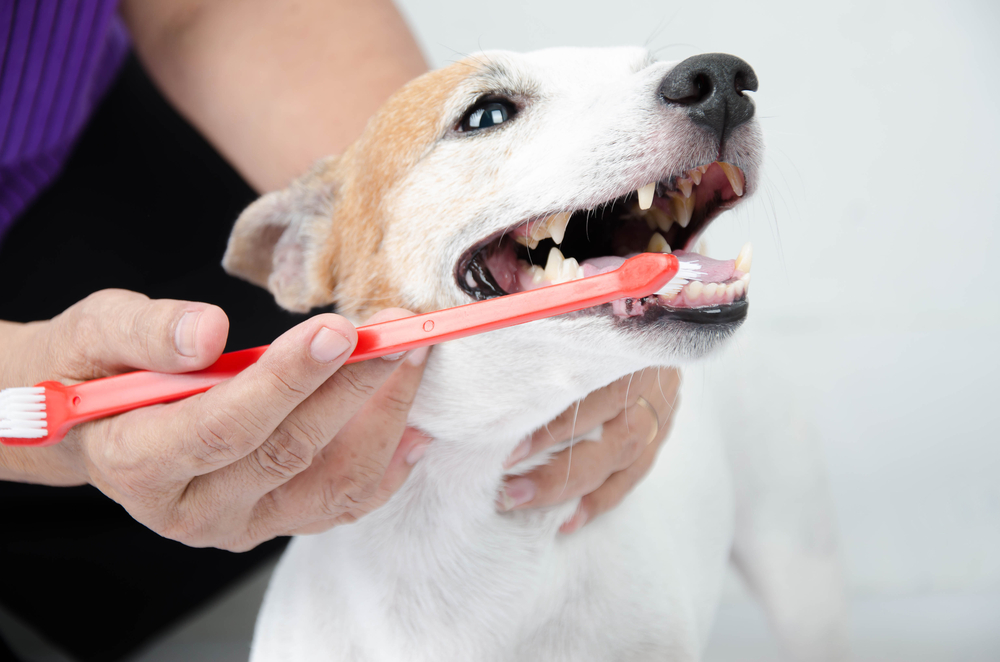
24 May Home Pet Dental Care Products That Work…And When and How To Use Them!
Walking up and down the aisles at a pet supply store and trying to decipher what is good and not good for your dog or cat can be overwhelming. It is an absolute chore to figure out what the best dental products are for your pet. It reminds me of going up and down the grocery aisle and looking at cereals—it’s mind-bending, to say the least! And the claims that some of these products make just don’t match efficacy. But fortunately, there is a great roadmap for you to use as a pet owner.
The Veterinary Oral Health Council (VOHC) is a non-regulatory agency created to test pet dental products claiming to be beneficial for plaque or calculus reduction. The submission of clinical trial results to VOHC on behalf of a product is voluntary. If the data submitted demonstrate the required dental efficacy, then the VOHC Seal of Acceptance is awarded to the product. So for me, and most Veterinary Dental Specialists (TM), I always look for the AVDC seal when making home dental care recommendations.

VOHC-Approved Pet Dental Care Products
TOOTHPASTE AND BRUSHING
The compliance rate for people brushing their pet’s teeth is less than 5%. Knowing that this is a low statistic, there are ways to help raise this number. Even with that knowledge, veterinary dentists have done studies indicating the efficacy of brushing, and how often one should brush their pet’s teeth.
Many people ask, if they brush their pet’s teeth with regularity, does that mean they don’t have to have a regularly scheduled anesthetic dental procedure? Absolutely not! While brushing does help remove subgingival plaque, toothbrush bristles only go 1-2 mm below the gumline Plaque can develop below that level as the normal gingival depth in dogs is 1-3 mm. So while yes, you are helping to prevent problems, brushing is NOT A SUBSTITUTE for annual anesthetic dental care.
It is recommended that one should brush their dog’s teeth at least THREE TIMES WEEKLY. In cases of existing periodontal disease, that frequency should be bumped up to DAILY.
Your Pet Dentist recommends PETSMILE ENZYMATIC TOOTHPASTE for dogs and cats. It comes with multiple flavor choices and while brushing is recommended, the enzymatic activity of the paste is such that you can rub the product on the tooth/gum interface. You may use a soft-bristled toothbrush or a veterinary toothbrush as well.
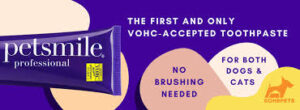
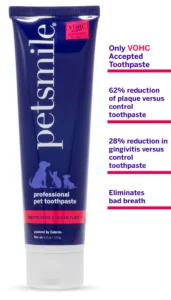
DENTAL WIPES
Dental wipes are another option for one to consider if their pet won’t allow for using a paste with/without brushing. We recommend HEALTHY MOUTH ANTIPLAQUE WIPES. However, while Wipes are good at removing biofilm and early forming plaque, it doesn’t get underneath the gumline that toothbrushing does.
DENTAL CHEWS
Fortunately, there are many daily VOHC-approved chews to choose from. Most chews use the mechanical action of chewing to remove calculus. But some do have products within them that help prevent plaque from forming into calculus. Our favorites are ORAVET CHEWS and TARTAR SHIELD SOFT RAWHIDE CHEWS.
OraVet uses a product called delmopinol to help prevent plaque formation, while Tartar Shield uses the mechanical nature of the chew to help reduce calculus. I would review the VOHC website to see the entire list as your pet may prefer one product over another. Check costs as well, as some may be more economical than others. Regardless, each chew does have calories so remember to deduct that amount in your daily calculations.
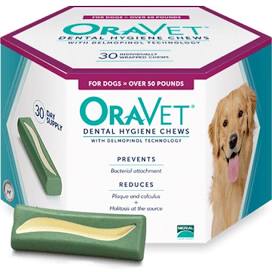
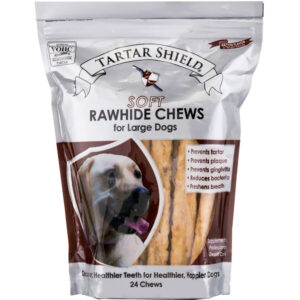
WATER ADDITIVES
I love VOHC-approved water additives, as they passively help prevent plaque formation. All you do is mix a small portion in your pet’s water. But if you use a water filter within your pet’s drinking water, it may make the product inactive.
A side note to using water additives: Introduce your pets to a smaller amount than recommended, and gradually increase over time so they get acclimated to the taste. Our favorite one is HEALTHY MOUTH. It is all-natural, and that brings a smile to our faces. Both dogs and cats can drink from the same bowl, as the concentration is the same.

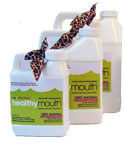
DENTAL DIETS
There are numerous VOHC-approved dental diets on the market. Some have higher fat content than others, so make sure you watch those calories! If your pet has been experiencing oral pain, don’t choose a dental diet. These diets are very hard and the mechanism of action is the removal of calculus when chewing. For cats with historical tooth resorption (TR), I would shy against using any dental diet.
CONCLUSION
Just because a pet dental product claims to reduce plaque or calculus formation, don’t believe it. Seek VOHC-accepted products for your pets. Then you WILL KNOW for sure that the product has been tested and meets all the requirements for plaque or calculus reduction. There is no substitution for an annual anesthetic dentistry procedure. We call our procedure a CORE (Comprehensive Oral and Radiographic Evaluation) and it has been described in detail in previous sections of our website (see SERVICES and then ANNUAL CARE).
If you have any further questions related to Home Care Products, please give us a call at 625-626-6015 or email at ypd@vetdentalms.com.
Barden Greenfield, DVM, DAVDC – Your Pet Dentist of Nashville
Images used under creative commons license – commercial use (5/24/2023). Photo by Littlekidmoment on Shutterstock


